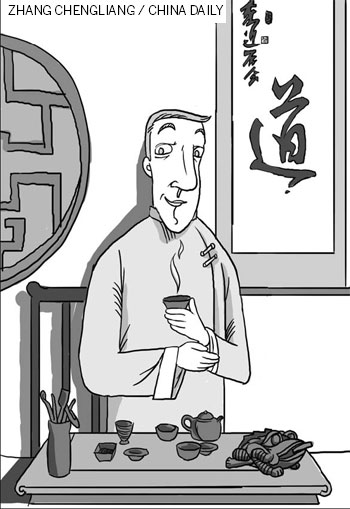Comment
The death of tea is brewing
By Todd Balazovic (China Daily)
Updated: 2010-03-10 10:24
 |
Large Medium Small |

What's China without a tea culture? It's Beijing, according to a tea enthusiast I met on my travels.
During my Spring Festival sojourn to the southern province of Yunnan I was completely blown away by the fascination and folklore surrounding the southerners' tea culture.
Perhaps it's the sun, or just the accessibility to fresh, high-quality teas - the dianhong, or Yunnan red tea, the wildflower chuhua and popular pu'er tea known for its medicinal properties - but Chinese southerners are absolutely passionate about their tea.
While wandering the markets of Kunming, Yunnan's capital, I began talking with the owner of a local tea shop. After a short conversation he invited me and a friend into his shop to try some teas.
Following the owner to the back of the shop, we were seated at one of the most intricate tea drinking tables I've ever laid eyes upon.
The table, spanning half the shop's width, was of a light-color wood with a natural look. Like the rice terraces of Yunnan province, the table touted tier after tier of carved plateaus, each slightly slanted toward the center so, should any tea spill, it would drain down the far side of the table.
Earthen animals lay scattered across the table, giving company to the large carved Buddha that sat smiling as the spotlight of the table.
After each brew of tea was concocted, our host dutifully poured the wastewater over a fortune frog, a clay figure with a coin stuck in its mouth.
He told us that by doing so, he was showing gratitude for the wasted water and ensuring good fortune in his future.
He then told me this table had been the centerpiece of his tea drinking life for more than a decade.
I asked him how much he paid for it. He politely refused to divulge the amount but added that it took much of his life savings at the time.

There are still legions of tea drinkers in the great city of Beijing, but in more than a year of living here I have yet to see someone so dedicated to the cause as our Yunnan host.
With this in mind I asked him about his perceptions about Beijing tea culture. His reply: There really isn't a big tea culture in Beijing.
I asked him why that is and he offered two insights as to why Beijingers have not embraced the type of tea culture celebrated by those in the south.
His first reason was quite oblivious - Beijing's climate is not suited for the growth of tea, so it is far less available.
But his second reason struck me as more depressing - Beijingers bustle about and don't take the time to appreciate the process involved in drinking tea.
They've traded chrysanthemum for coffee, leaving tea as simply a drink to quench thirst. There is too much business to be done to lounge around, chat leisurely and drink tea.
Similarly, while in Chengdu not long ago, I was asked where I was from by an English-speaking Chinese tea drinker who had been watching me as I surveyed the contents of his shop.
After telling him I lived in Beijing he launched into a diatribe about Beijingers, saying: "I could never live in Beijing. it is much too busy. People run around all day and never take time to enjoy life. Here in Chengdu we work, but we take time to enjoy the tea and play some mahjong."
Though an industrious attitude is something to be proud of, it is a mixture of both work and pleasure that makes a fulfilling lifestyle.
Perhaps Beijingers should take a note from their brothers and sisters in the south and take the time to stop and brew the roses.







